If you’re interested in airplanes, spacecraft, missiles, and satellites, then you might consider enrolling in an online masters aerospace engineering program.

Do you have an analytical, mathematical mind? Are you intrigued by challenging concepts, such as aerodynamics, thermodynamics, and material sciences?
Editorial Listing ShortCode:
If so, then you might find a career as an aerospace engineer to be both exciting and rewarding! If you already work in the aerospace engineering industry, then a masters may help you advance in this lucrative field.
Aerospace engineers have strong investigative qualities and may enjoy researching, developing and problem-solving. A masters degree in aerospace engineering focuses on the design, development, testing, and manufacturing of satellites, spacecraft, missiles, and aircraft.
Universities Offering Online Masters in Aerospace Engineering Degree Programs
Methodology: The following school list is in alphabetical order. To be included, a college or university must be regionally accredited and offer aerospace engineering degree programs online or in a hybrid format.
Georgia Institute of Technology
The Georgia Institute of Technology offers a Master of Science in Aerospace Engineering online program. Students may choose between a non-thesis degree and a thesis degree. Both degree pathways require students to complete 33 credit hours to graduate. Distant Learning students must complete the Special Problem Research Project course.
The Georgia Institute of Technology is accredited by the Southern Association of Colleges and Schools Commission on Colleges.
Missouri University of Science and Technology
The Missouri University of Science and Technology offers a Master of Science in Aerospace Engineering online program.
Students are required to complete 30 credit hours, with 6 credit hours either being dedicated to a thesis or taken from out-of-department courses. To apply, students must have a bachelor’s degree in a relevant field with a GPA greater than 3.0.
Missouri University of Science and Technology is accredited by the Higher Learning Commission.
Purdue University
Purdue University offers an online Master of Aeronautics & Astronautics Engineering program. The program doesn’t require students to complete a thesis. Students must choose a major area of study and select either a Mathematics or Statistics minor. To graduate, students must complete 30 credit hours with an overall GPA of 3.0.
Purdue University is accredited by the Higher Learning Commission of the North Central Association of Colleges and Schools.
Texas A&M University
Texas A&M University offers an online Master of Engineering in Aerospace program. The program does not require a thesis to complete. Students must complete at least 30 credit hours to graduate, including a maximum of 2 credit hours from a seminar course. To be eligible, students must have a bachelor’s degree in aerospace engineering.
Texas A&M University is accredited by the Southern Association of Colleges and Schools Commission on Colleges.
University of Alabama
The University of Alabama offers an online Master of Science in Aerospace Engineering and Mechanics program. Students can choose between completing a thesis or not. Both programs require the completion of 30 credit hours.
Up to 12 credit hours may be transferred from another institute, and 6 hours may be transferred from Test Pilot School.
The University of Alabama is accredited by the Southern Association of Colleges and Schools Commission on Colleges.
University of Colorado – Boulder
The University of Colorado—Boulder offers an online Master of Science in Aerospace Engineering program. Students must complete 30 credit hours to graduate, with only 18 needed in aerospace.
The program can typically be completed in 2 years and offers five focus areas that students may choose to take, including Autonomous Systems and Bioastronautics.
The University of Colorado Boulder is accredited by the Higher Learning Commission.
University of Florida
The University of Florida offers an online Master of Science in Aerospace Engineering program. Students taking the thesis degree option must complete 24 credits of coursework and 6 credits of thesis research.
Students that don’t take the thesis option must complete 30 graded credit hours and a final examination.
The University of Florida is accredited by the Southern Association of Colleges and Schools Commission on Colleges.
University of Illinois – Urbana Champaign
The University of Illinois—Urbana Champaign offers an online Master of Engineering in Aerospace Engineering program. This is a non-thesis, non-research program and requires 32 credit hours to be completed.
Students may choose to specialize in one of nine areas. To apply, students must have a bachelor’s degree in a relevant field with a minimum GPA of 3.0.
The University of Illinois at Urbana-Champaign is accredited by the Higher Learning Commission.
University of Southern California
The University of Southern California offers an online Master of Science in Aerospace Engineering program. The program allows for a specialization in one of seven fields and can typically be completed in 2 years.
To graduate, students must complete 27 units with a GPA of at least 3.0. To be eligible for the program, students must have a relevant bachelor’s degree.
The University of Southern California is accredited by the Western Association of Schools and Colleges, the Senior College and University Commission.
University of Washington
The University of Washington offers an online Master of Aerospace Engineering program. The program is designed to be part-time and completed in 3 years. Students are expected to select an area of concentration from Controls, Fluids, Structures, and Composites.
To be eligible for the program, students must have a bachelor’s in aerospace with a GPA of 3.0 or higher.
The University of Washington is accredited by the Northwest Commission on Colleges and Universities.
Online Masters in Aerospace Engineering Programs
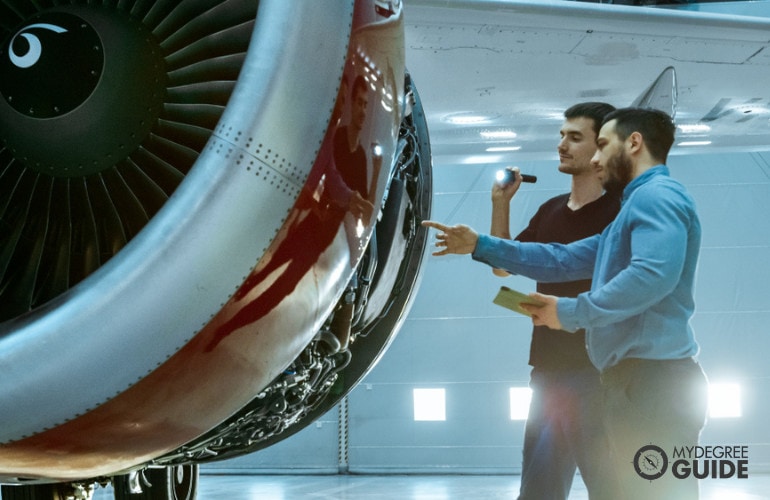
Aerospace engineering is a challenging and demanding field of science. A master’s degree in aerospace engineering is an advanced degree that can expand your knowledge of space design and operations. Before getting your masters, you typically need to have a bachelors degree in aerospace engineering or a related field.
With an MS in Aerospace Engineering, you can choose to specialize in one of two areas: aeronautical engineering or astronautical engineering. A masters in aeronautical engineering concentrates on the design and manufacturing of aircraft, airplanes, helicopters, and jets.
Astronautical engineering focuses on spacecraft, rockets, spaceships, satellites, lunar probes, and related machinery.
With an MS in Aerospace Engineering, you have the opportunity to pursue careers in aircraft design, spacecraft design, aerospace research and development, education, or drafting. Graduates may also work as aerospace technicians or maintenance engineers.
Aerospace engineers work with civil, military, and commercial space organizations. They can work with the latest technologies and trends as well, such as 3D printing, zero fuel aircraft, and structural health monitoring.
If you pursue an online aerospace engineering masters, you can learn about developing and improving propulsion systems and testing the resistance of various materials and components. You can also work on finding ways to make aircraft faster, more efficient, and less polluting.
Although aerospace engineering graduate programs vary from one university to the next, your coursework will usually be heavy in math and science. You’ll generally take courses in physics, dynamics, thermodynamics, linear vibrations, engineering mathematics, and mechanical principals.
Aerospace Engineering Careers & Salaries
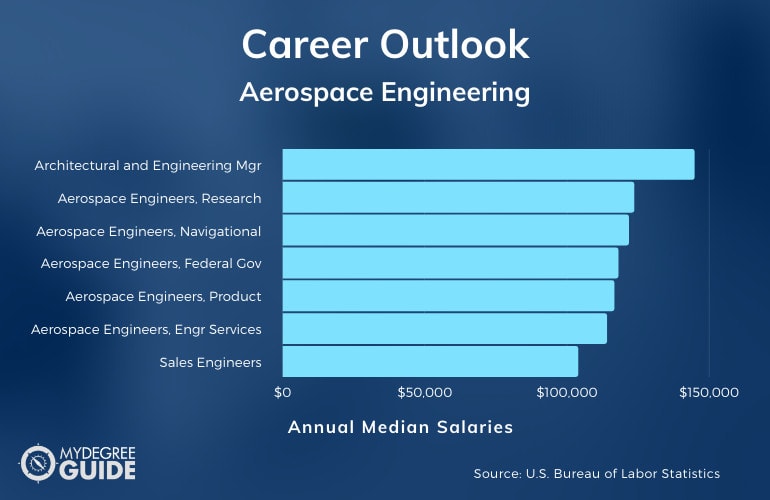
There are many career possibilities that can accompany a master’s degree in aerospace engineering. Not only do you have two different specialty areas to choose from, but you can narrow your options down even further by deciding if you want to go into:
- Design
- Manufacturing
- Education
- Science and data management
- Drafting
- Mechanical engineering
There are also a variety of industries to choose from, such as the federal government, engineering services, parts manufacturing, or research and development. According to the Bureau of Labor and Statistics, the annual median wage for aerospace engineers is $116,500.
| Careers | Annual Median Salaries |
| Architectural and Engineering Managers | $144,830 |
| Aerospace Engineers, Research and Development | $123,600 |
| Aerospace Engineers, Navigational, Electromedical, and Related Instruments Manufacturing | $121,750 |
| Aerospace Engineers, Federal Government | $118,050 |
| Aerospace Engineers, Product and Parts Manufacturing | $116,620 |
| Aerospace Engineers, Engineering Services | $114,030 |
| Sales Engineers | $103,900 |
| Materials Engineers | $93,360 |
| Mechanical Engineers | $88,430 |
According to the Bureau of Labor Statistics, the majority of aerospace engineers work for aerospace product and parts manufacturing firms. Some engineers decide to pursue careers as sales engineers, selling sophisticated scientific and technological equipment to other industries and businesses.
If you are not interested in sales or management but still want to pursue a high-paying career, you might consider an aerospace engineering career in research and development.
Aerospace Engineering Masters Curriculum & Courses
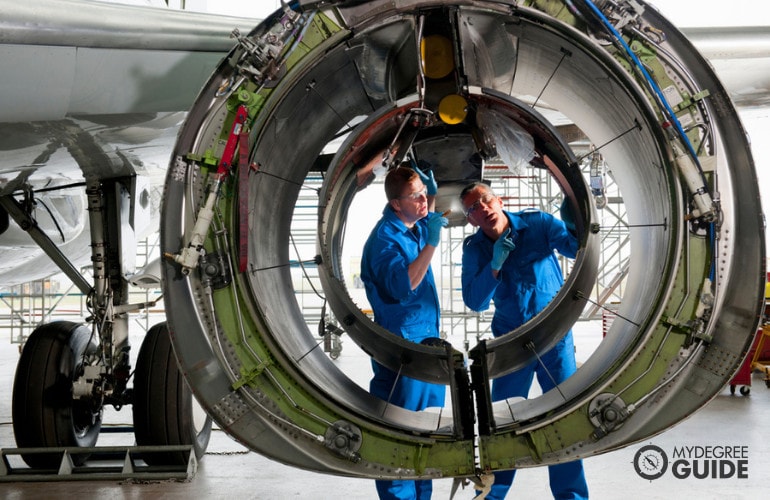
Courses vary from one university to another, but as part of your program, you may complete similar courses to the ones listed here:
- Aerodynamics and Fluid Dynamics: This course studies airflow over the aircraft.
- Aeroelasticity and Structural Dynamics: In this class, you’ll learn how inertial, elastic, and aerodynamic forces interact.
- Flight Mechanics and Control: This course covers how forces affect a vehicle in flight, how the vehicle responds to those forces, and how to modify the vehicle to get the desired result.
- Propulsion and Combustion: In this class, you’ll learn how to create mechanical power using internal combustion engines.
- Structural Mechanics and Materials Behavior: In this course, you’ll learn about the stress and strain on the mechanisms of a vehicle in flight.
- System Design and Optimization: This course teaches the application of algorithms to improve the performance and design of aircraft.
- Data Analysis and System Identification: In this class, you’ll learn methods of data analysis and empirical modeling.
- Probability and Random Processes: This course is an introduction to probability and random processes.
- Stochastic Processes: This course builds on probability and random processes by covering wide sense stationary processes, renewal and regenerative processes, branching processes, and more.
- Nonlinear Systems and Control: This course builds on the state-viable theory of linear control systems in order to design and analyze nonlinear control systems.
Some masters programs may have a research requirement, such as a direct study course or a thesis. There are some online programs that waive this requirement, though.
Admissions Requirements

Graduate programs are usually open to engineering, mathematics, and physical science students. Some programs require a minimum GPA requirement for undergraduate studies.
To apply, you typically need to submit the following:
- Online application
- Letters of reference
- Statement of purpose
- Official transcripts
You can also be asked for your records of internship and any work experience you may have. A growing number of schools no longer require the GRE or GMAT, but some aerospace engineering programs do still require the GRE, often with a minimum score of 300.
You can check your prospective school’s specific admissions requirements before applying.
Accreditation
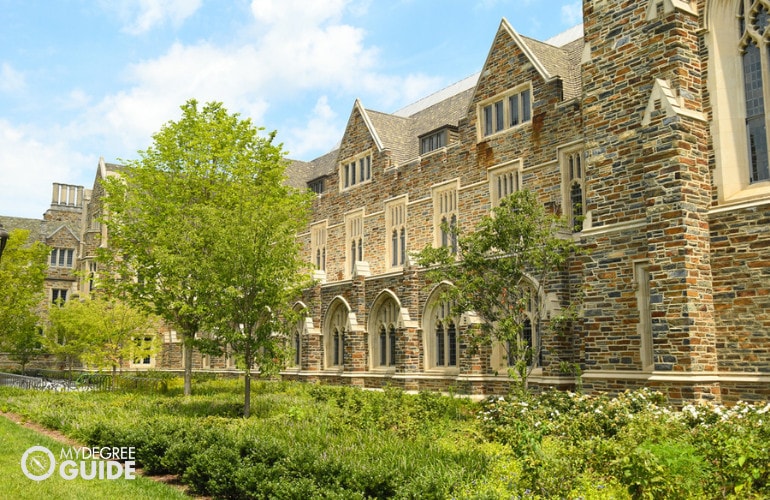
When choosing your online masters in engineering program, you may want to ensure that a school has regional accreditation. A school has to earn the right to be accredited, so accreditation ensures that a school has met certain standards.
Attending an accredited university can be important because:
- Eligibility for financial aid. Financial aid is usually only awarded to accredited schools.
- Transferability of credits. Credits transfer easier between accredited schools.
- Eligibility for certification exams. You may need an accredited degree to sit for a certification exam.
- Increased job opportunities. Employers often prefer graduates from an accredited university.
Accreditation validates your degree, and the US Department of Education‘s website has a great tool for looking up accredited schools.
Financial Aid and Scholarships

There aren’t always as many options when it comes to federal aid at the graduate level. To see if you qualify, though, you can visit the Federal Student Aid‘s website.
On the other hand, you may qualify for a variety of scholarships that are specifically for aerospace engineering students. There are many private donors and professional organizations with connections to the aerospace industry that award scholarships to its members or to the general community.
You can start by searching the internet for state and local nonprofits. You can also check with your employer to see if they offer professional development or employee training programs. You can also check with your school. Many universities have scholarship programs as well.
What Do Aerospace Engineers Do?
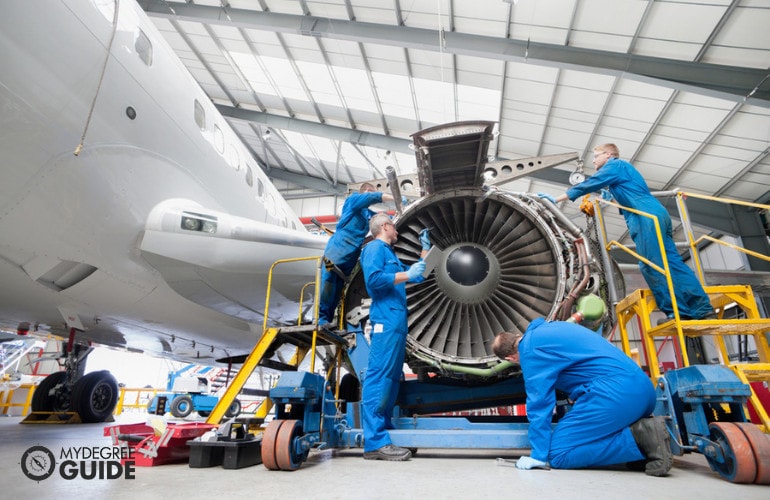
Aerospace engineers design spacecraft and aircraft, along with the parts for these crafts. They also develop new technologies for use in aviation, space, and the military.
Aerospace engineers often specialize in one area. Common specializations include robotics, structural design, aerodynamic fluid flow, and instrumentation and communication.
An aeronautical engineer often works with aircraft and their performance within the Earth’s atmosphere. An astronautical engineer, on the other hand, focuses on the design of spacecraft and their performance both inside and outside of the Earth’s atmosphere.
A few career options for aerospace engineers include research, satellite and missile design, and product and parts design and manufacturing. With a master’s degree in aerospace engineering, an aerospace engineer can also pursue more management and senior positions.
Where Do Aerospace Engineers Work?
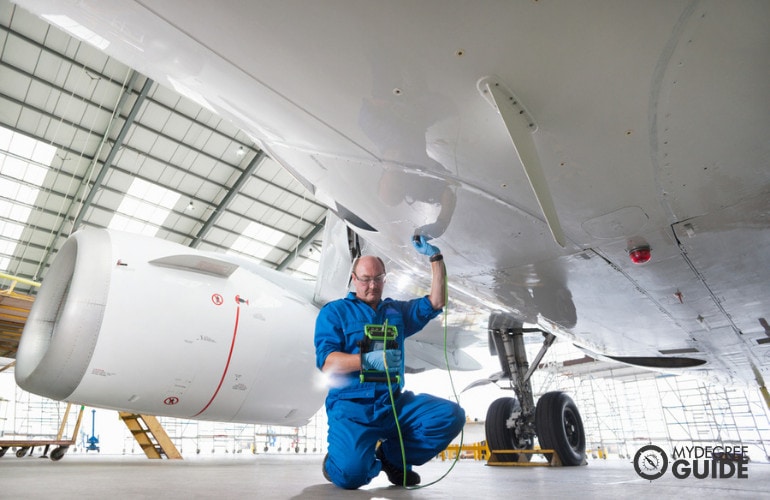
Aerospace engineers can work in a variety of industries. They can work in research and design or even for companies that need drafters, compliance officers, and hands-on technicians
The top industries for aerospace engineers are the following:
- Aerospace product and parts manufacturing
- Federal government
- Engineering services
- Instruments manufacturing
- Research and development services
According to the Bureau of Labor Statistics, aerospace product and parts manufacturing firms employ the majority of aerospace engineers. Aerospace engineers often work for private companies as well as the military and other sectors of the federal government.
What Can You Do with a Masters in Aerospace Engineering?

Aerospace engineers are primarily employed in the manufacturing and design industry, but that is not the only path for graduates with a master’s degree in aerospace engineering.
Aerospace engineers can also analyze and design airplanes, helicopters, space shuttles, and other spacecraft. They can research and develop new or trending technologies, and they can create and test prototypes to make sure they function according to design.
Professionals with a masters in aerospace engineering have also been known to pursue careers in related fields, such as materials engineering, mechanical engineering, and sales engineering. Along with experience, a masters can also help qualify you to pursue leadership or management roles.
How Long Does It Take to Get a Masters in Aerospace Engineering Online?
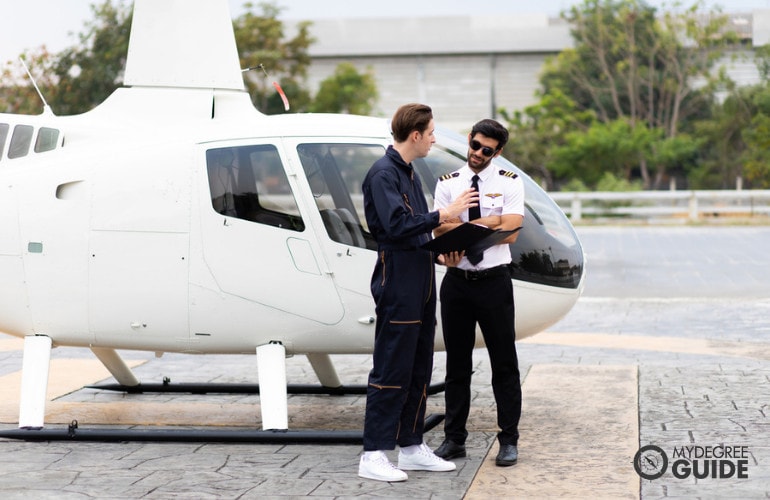
How long it takes you to graduate from an online aerospace engineering masters degree program can depend on your school and your course load.
Most online masters programs take about 1 to 2 years to complete when studying full-time and following a traditional 16 week semester. If you need to make up prerequisite coursework or prefer to attend part-time, it may take longer for you to complete the program.
There are online programs, though, that have 8 week terms, which may all you to finish your degree sooner if you attend year-round.
Is There a Demand for Aerospace Engineers in the Future?
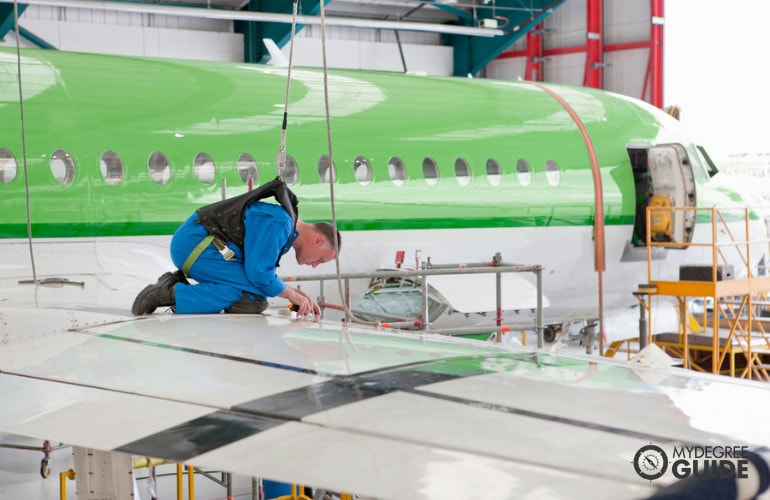
Yes, according to the Bureau of Labor Statistics, employment for aerospace engineers is expected to grow 3% over the next ten years, which is as fast as average.
There is demand for research and development engineers because aircraft are continuously redesigned for less noise pollution and better fuel efficiency. Growing interest in unmanned aerial systems and new developments in small satellites can also drive growth in the industry.
Employment opportunities can be especially favorable for graduates who have experience in software, education, and stress and structural engineering.
How Much Do Aerospace Engineers Make?
How much an aerospace engineer makes can depend on their position, experience, employer, and geographic location.
According to the Bureau of Labor Statistics, aerospace engineers make an average salary of $116,500 per year, but some of the highest-paying jobs pay well beyond that. The average salary for aerospace engineers in the research and development sector is $123,600, and the average salary for architecture and engineering managers is $144,830.
These salary amounts are strictly the average pay for these positions across the board. You could make more or less, depending on where you are hired.
Is a Masters Degree in Aerospace Engineering Worth It?
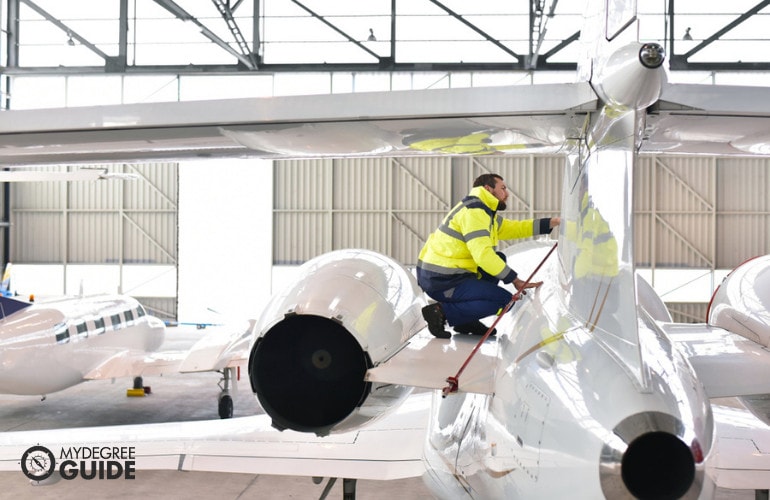
Yes, a masters in aerospace engineering is worth it for many students. A masters degree can often help you qualify for promotions or higher wages. A masters may also qualify you to teach aerospace engineering at community colleges. You can also choose to pursue independent research positions.
Technology is forever changing and growing. There is increased interest in unmanned aerial systems and satellites. Aircraft and spacecraft are constantly redesigned, propelling growth in the field of aerospace engineering.
Getting Your Masters Degree in Aerospace Engineering Online

You may want to consider getting your online masters in aerospace engineering if you are interested in the building, maintenance, and design of aircraft and spacecraft.
A graduate degree in this field can open up a variety of high-paying, challenging career opportunities in various industries. Common industries include research and design, parts manufacturing, and education.
Professionals in this field tend to work for private companies, the military, or federal organizations. As technology continues to advance, aerospace engineering continues to have a positive job outlook.
With the flexibility of an online engineering degree program, you may be able to maintain your current responsibilities while furthering your studies. If you want to advance in the field of aerospace engineering, you can start the next step of your educational journey today by exploring accredited online masters programs.
